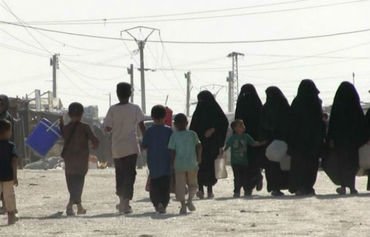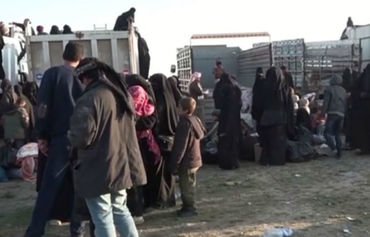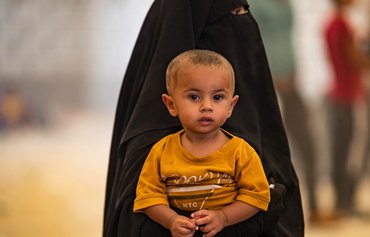A new study that says female extremists in Europe or returning from areas of Iraq and Syria should not be regarded as "brides" but as militants capable of active roles in future attacks rings true with officials at Syria's al-Hol camp.
The study, issued in Brussels on Wednesday (September 11th) by the Slovakia-based non-governmental group GLOBSEC, looks at data from 326 European extremists captured, deported or killed since 2015.
It found that though women and girls were a tiny minority of so-called "foreign terrorist fighters", many still represented a significant threat.
Out of the 43 female suspects in the study, there were cases of "attack planners, active female jihadi recruiters, propagandists and what effectively could be called a logistical officer" who had sheltered fighters, the report said.
![An ISIS woman in al-Hol camp receives treatment from a Kurdish Red Crescent medic. [Photo courtesy of Kurdish Red Crescent]](/cnmi_di/images/2019/09/13/19908-ISIS-woman-Hol-600_384.jpg)
An ISIS woman in al-Hol camp receives treatment from a Kurdish Red Crescent medic. [Photo courtesy of Kurdish Red Crescent]
![ISIS women wait with their children to obtain medicine at al-Hol camp. A recent study has found that female extremists in Europe or returning from Iraq or Syria should be regarded not as 'brides' but as militants capable of active roles in future attacks. [Photo courtesy of Kurdish Red Crescent]](/cnmi_di/images/2019/09/13/19909-ISIS-women-children-600_384.jpg)
ISIS women wait with their children to obtain medicine at al-Hol camp. A recent study has found that female extremists in Europe or returning from Iraq or Syria should be regarded not as 'brides' but as militants capable of active roles in future attacks. [Photo courtesy of Kurdish Red Crescent]
It noted an attempt by a female cell to bomb Paris's Notre Dame cathedral three years ago and recent efforts by imprisoned European female members of the "Islamic State of Iraq and Syria" (ISIS) to launch crowd-funding campaigns.
"It becomes clear that the 40-plus women included in the dataset are not mere 'brides', as the role they play in terrorist networks is more sophisticated and demanding," the report said.
'Not merely wives or mothers'
It has become clear to officials at al-Hol camp, east of al-Hasakeh, that many of the ISIS women being held there are not merely wives or mothers, Kurdish Red Crescent official Azad Dudeki told Diyaruna.
Their work with ISIS included al-hesba ("religious police") duty and armed patrols in addition to logistical activities such as online recruitment, he said.
Many of these women, both Syrian and foreign nationals, continue to adhere to the group's hardline ideology and apply its teachings inside the camp, he added.
He described them as cruel to the point of criminality, pointing to their harsh treatment of women who try to depart from the group’s rigid tenets and to their attacks on the guards assigned to protect them.
"The section of al-Hol camp that houses ISIS women is one of the most dangerous places anyone could be in," Dudeki said, noting that the most radical residents are those who arrived after the group was ousted from al-Baghouz.
They have organised al-hesba teams that punish anyone who breaks with them, he said, noting that there have been at least two recorded cases of girls being killed because they had taken off their niqab.
They also have prevented other women from undergoing medical examinations alone, assigning al-hesba escorts to all patients in order to keep them in line.
There have been a number of recorded cases of ISIS women stabbing guards and disappearing among the other women, all of whom wear the niqab, which makes it difficult to identify the perpetrator, he added.
Link between crime, extremism
The GLOBSEC study examined the connection between crime and extremism, noting that many extremist fighters started out with ordinary criminal records and were radicalised behind bars.
A third of the cases studied were foreign fighters who, on return to Europe, "often play the role of jihadi entrepreneurs or charismatic cell or network leaders", the report said.
At the presentation of the report, EU officials connected to security policy were told that most of those convicted in Europe of terrorism crimes went on to commit crimes after their release.
Deradicalisation efforts were mostly unsuccessful.
"Dutch staff after years of work could give only two examples of prisoners who were deradicalised," said Bart Schuurman, a security researcher at Leiden University in the Netherlands, who contributed to the report. "It is well-nigh impossible in most cases."
He noted that the debate about deradicalisation remained prominent, but "I do not think it is useful".
Instead, he and others who worked on the report said, prison authorities were focusing more and more on segregating committed extremists from the general incarcerated population to prevent them from radicalising others.

![A large section of al-Hol camp in the Syrian province of al-Hasakeh houses ISIS women, many of whom still espouse the group's hardline ideology. [Photo courtesy of Azad Dudeki]](/cnmi_di/images/2019/09/13/19907-Syria-Hol-camp-600_384.jpg)






